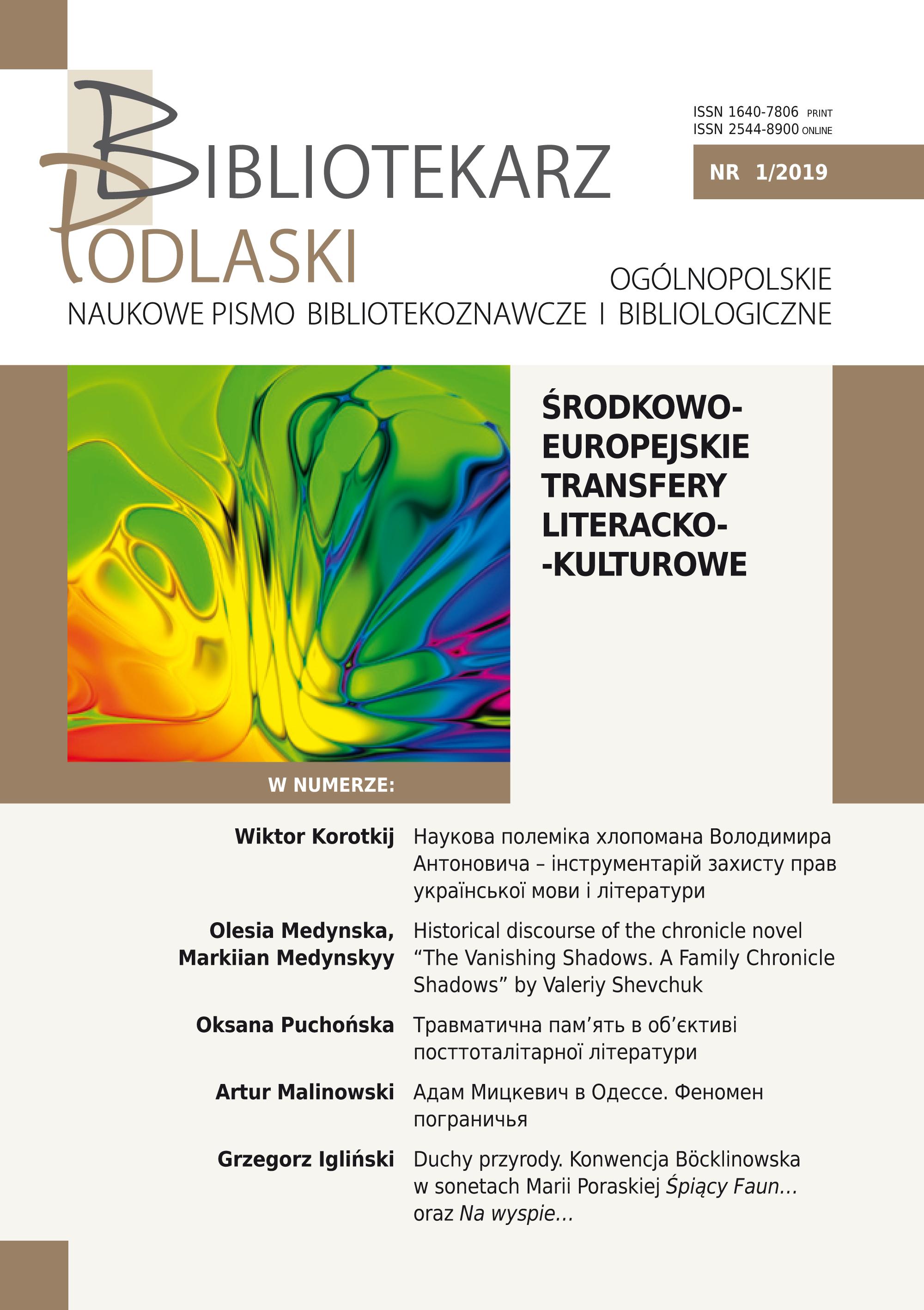Abstract
An experience of the past, without any doubt, is the construct of national identity. It does not depend on the socio-cultural discourse. It is important to look at the traumatic experience, which not only influences the forming of contemporary social consciousness, but determines the behavior of society in the conditions of new historic challenges. An example can be traumatic memory of the Ukrainians. Now, with the advent of a new threat to independence, this trauma is returning twice as powerful. Literature has traditionally become the most active instrument of perceiving and reflecting such processes, while at the same time fulfilling the function of cultural therapy against the traumatized totalitarian past.
References
Białecka Alicja, Ekspresja lteracka jako strategia przetrwania po traumie. Doświadczenie Aushwitz w literaturze kobiecej, [w:] Kobiety wojny. Między zbrodnią a krzykiem o godność, red. Alicja Bartuś, Oświęcim 2014, s. 249-256.
Bilczewski Tomasz, Trauma, translacja, transmisja w perspektywie postpamięci, [w:] Od pamięci biodziedzicznej do postpamięci, pod red. Teresy Szostek, Romy Sendyki, Ryszarda Nycza, Warszawa 2013, s. 40-62.
Caruth Cathy, Trauma: Explorations in Memory, Baltimore 1995.
Delaperrièrre Maria, Miejsca pamięci czy pamięć miejsc? Kilka refleksji na temat uobecniania przeszłości w literaturze współczesnej, „Ruch literacki” 2013, R. LIV, Z. 1 (316), s. 49-61.
Hartman Geoffrey H., Wiedza traumatyczna i badania literackie, [w:] Antologia studiów nad traumą, pod red. Tomasza Łysaka, Kraków 2015, s. 377-415.
Hnatiuk Ola, Pożegnanie z imperium. Ukraińskie dyskusje o tożsamości, Lublin 2003.
Jarzębski Jerzy, Apetyt na przemianę. Notatki o prozie współczesnej, Kraków 1997.
Kiś Oksana, Kołektywna pamjatʹ ta istoryczna trawma: teoretyczni refłeksiji na tli żinoczych spohadiw pro Hołodomor. “U poszukach własnoho hołosu: Usna istorija jak teorija, metod ta dżereło”, pa red. Helinady Hrinczenko, Nataliji Chanenko-Frizen. Charkiw: PP «TORHSIN PLUS» 2010, s. 171-191.
Kłoskowska Antonina, Tożsamość i identyfikacja narodowa w perspektywie historycznej i psychologicznej,„Kultura i Społeczeństwo” 1992, nr 1, s. 139.
Kołodziejczyk Dorota, Postkolonialne odzyskiwanie pamięci: zawłaszczenia, fabulacje, niesamowite odpominanie, Od pamięci biodziedzicznej do postpamięci, pod red. Teresy Szostek, Romy Sendyki, Ryszarda Nycza, Warszawa 2013, s. 277-305.
LaCapra Dominick, Writing History. Writing Trauma, Baltimore: Johns Hopkins University Press, 2001.
Misztal Barbara, Theories of Social Remembering. Philadelphia, Open University Press 2003, s. 160.
Poliszczuk Jarosław, Izdyskursiw i dyskusij, Charkiw 2008.
Trepte Hans-Christian, W poszukiwaniu „innej wolności”. Opcja emigracyjna, czyli nowy nomadyzm, [w:] Opcja niemiecka. O problemach z tożsamością i historią w literaturze polskiej i niemieckiej po 1989 roku, red. Wojciech Browarny, Monika Wolting, współpr. Markus Joch, Kraków 2014, s. 179-193.
Żanie Pjer, Ewolucyja pamiati i poniatije wriemieni. “Psichołogija pamiati”, pod ried. Julija Borisowna Gipppienriejtier, Walerij Jakowlewicz Romanowa, Moskwa: Izd-wo Czero 2000, s. 371-379.
Articles published in the “gold open access” mode on the basis of a non-exclusive license agreement between the publisher and the author. Permitted use:
- the publication may be read and stored on any device,
- the publication may be cited (with obligatory reference to the author, the title of the text, as well as the full title, bibliographic address of the issue and page of the journal)
The editorial team of “Bibliotekarz Podlaski” implements an open access policy by publishing materials in the form of the so-called Gold Open Access. From volume 42 (issue 1/2019), the journal is available under the Creative Commons license (Attribution – ShareAlike: CC BY-SA).
The key declarations of the Open Access and Open Science movement, which we fully support, are available on the CEON Open Science website.
COPYRIGHT:
The editorial team of “Bibliotekarz Podlaski” implements an open access policy by publishing materials in the form of the so-called Gold Open Access. The journal is available under the Creative Commons license – Attribution – ShareAlike 4.0: International: CC BY-SA 4.0).
The key declarations of the Open Access and Open Science movement, which we fully support, are available on the CEON Open Science website.
“Bibliotekarz Podlaski” allows its readers to read, download, copy, distribute, print, search and link to the full content of articles. We enable full, immediate, unlimited (both in a territorial, temporal and technical sense) open access to all published content, in accordance with the principle that freely available research increases and accelerates the global development of science and the exchange of knowledge.
The editorial team of “Bibliotekarz Podlaski” encourages authors to place articles published in the journal in open repositories (after the review or the final version of the publisher), provided that a link to the journal’s website is provided.
The journal does not charge the authors any fees for accepting and publishing their texts.


